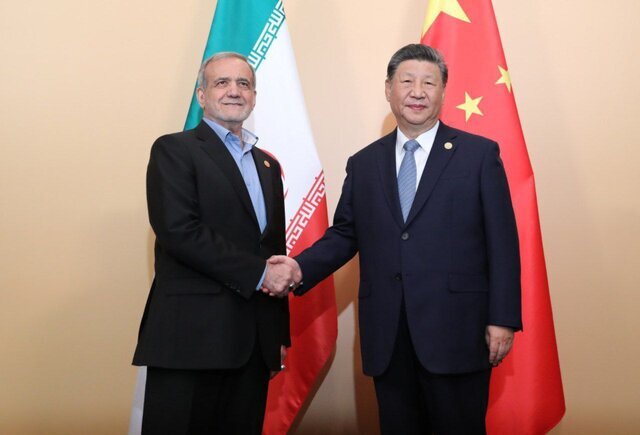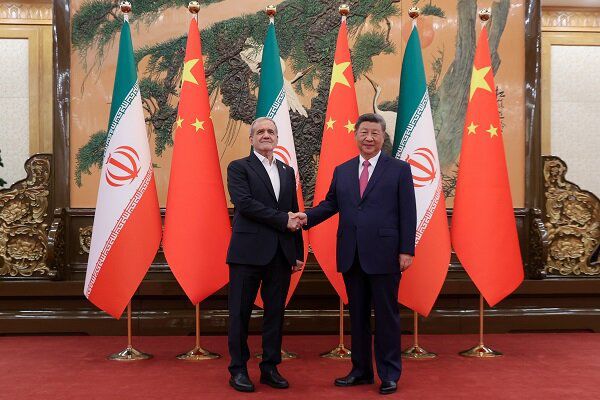The president's recent trip to China has once again drawn the attention of experts to the strategic role of the 25-year-old treaty between Tehran and Beijing; a comprehensive agreement that is considered a solid support in the midst of an economic war with the West.
According to Ashura News, citing Mehr News Agency, the recent trip of Masoud Pezzekian and his accompanying economic team to China has once again led expert opinions to the conclusion that Iran, in the period of transition from the current economic and even political crises, must further strengthen the existing relations between itself and China, in accordance with the 25-year-old treaty between Iran and China. This necessity has been repeatedly emphasized by economic experts, and regardless of that, in different periods, officials of the Ministry of Economy have also emphasized the necessity of strengthening these relations in one way or another and have suggested solutions for its realization.
Given that the Iran-China agreement covers various aspects of oil and gas, transit, industry, agriculture, technology, and banking services, it is certain that the Ministry of Economy can establish a headquarters to coordinate the implementation of this agreement between Iran and China in order to implement these aspects, and this headquarters should have the mission of aligning the programs and contracts of the relevant ministries, including oil, industry, mining and trade, roads and urban development, and the Central Bank, with the frameworks of this agreement.
In line with the importance and necessity of forming this headquarters, it is absolutely necessary that the headquarters meetings be held monthly and with regular reporting on the progress of each sector, and each ministry is responsible for submitting its schedule, projected budget, and foreign exchange needs to the Ministry of Economy to be met through financing mechanisms in cooperation with the Chinese side.
Today, China is considered a major economic power in the world; This is an issue that even the United States and Western countries acknowledge, and even the US President himself has repeatedly expressed concern about China's economic power and its influence in the global arena.
According to many experts and economic analysts, countries that are members of the Shanghai Organization cover a significant portion of the world's population and, if they converge in one area, especially the economy, they can play a very serious role in the world's economic balance. From this perspective, close relations with China in the first place and active membership in the Shanghai Organization in the second place are of particular importance to Iran; especially in the circumstances where the Islamic Republic is currently facing a full-scale economic war from the United States and the West. This issue can be a solid support for the country.
Economic analysts describe the trip to China as having a significant role in economic exchanges and reducing sanctions, considering the issue of activating the trigger mechanism. It seems that the trigger mechanism has a psychological aspect rather than an operational aspect, and its psychological aspect is more prominent than its executive aspect. Just as in the past, the serious sanctions of the JCPOA were not completely lifted, without the activation of the trigger mechanism, Iran was under the most severe sanctions. What is important is that the economic relationship between Iran and China can have a significant impact on economic exchanges and countering sanctions imposed by the West.
In fact, the presence of the President and the Minister of Economy on China's National Day and the Shanghai Summit, given the presence of numerous countries and major economies in the world, can be a solid support for the Islamic Republic against sanctions pressures and threats from the West.
The 25-year Iran-China Treaty, in the form of a comprehensive document of cooperation in the economic, industrial, energy, security, and cultural fields, was approved by the Iranian government in 2020. This document is the product of more than two years of negotiations and coordination between the two countries and its goal is to establish long-term and sustainable relations in all areas. In the economic sector, the main focus has been on increasing the volume of trade exchanges, developing infrastructure, and participating in large-scale projects.

China, as the world's second largest economy and Iran's largest trading partner, has accounted for a major portion of Iran's trade and capital exchanges in the past decade, and with the full implementation of the treaty, it is expected that the volume of Chinese direct investment in Iran will increase several times over the next five years.
The implementation of the 25-year Iran-China treaty by the Ministry of Economy is not only an economic project, but also a national strategy that can enhance Iran's position in the global supply chain. The success of this program depends on the government's ability to manage resources, institutional coordination, and make optimal use of international opportunities. If the implementation requirements are properly met, this treaty can become a turning point in the history of Iran's economic cooperation with East Asia.
Some also believe that the 25-year treaty can lead to sustainable achievements when, at the same time as developing foreign relations, its domestic foundations, such as transparency in the investment process, a serious fight against economic corruption, improving the tax system, and creating sustainable security for investors, are also considered and strengthened to prevent foreign capital from being directed towards inefficient or risky projects.
On the other hand, the experience of other countries shows that China usually seeks long-term benefits and security of its resources in strategic cooperation. Therefore, Iran must be careful that cooperation does not proceed one-sidedly to the benefit of the Chinese side, and it is necessary for Iran to seriously pursue the process of technology transfer and localization of knowledge by utilizing the capacity of universities and research centers so as not to become merely an importer of Chinese equipment and services.
With its privileged geopolitical position, Iran can become a key link in China's Belt and Road Initiative. The plan, which aims to connect East Asia to Europe and Africa, could generate tens of billions of dollars in transit revenue and infrastructure development for the country if it passes through Iranian territory. Achieving this goal will require extensive investment in the rail network, ports, and international transportation corridors.
Iran’s 25-year-old agreement with China is a strategic opportunity to redefine Iran’s place in the global economic order. Proper management of this opportunity requires national determination, institutional cohesion, and a long-term view of the country’s interests. If such conditions are met, Iran can open a new path for sustainable development and a more active presence in the international arena from the current economic pressures.


Post a comment